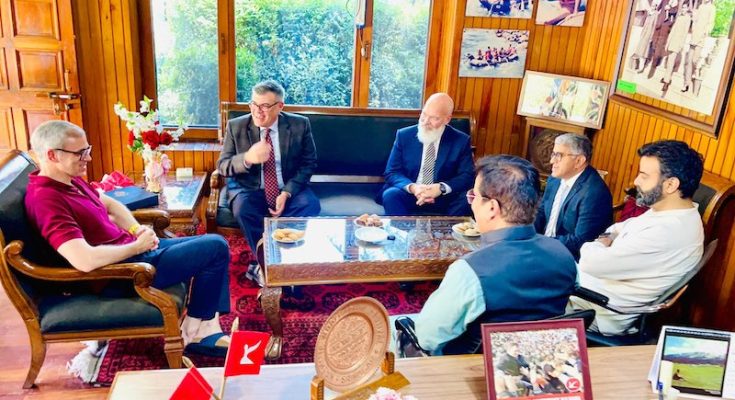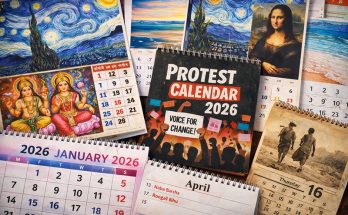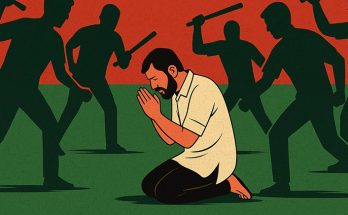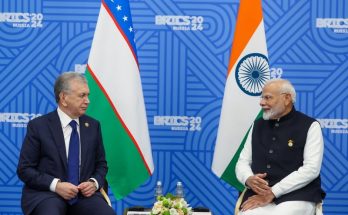#JammuAndKashmir, #JKPolls, #OmarAbdulla, #SheikhHasina, #NarendraModi, #JoeBiden, #US, #IndiaUS
New Delhi/IBNS-CMEDIA: Hours before Prime Minister Narendra Modi had a telephonic conversation with the United States President Joe Biden to discuss a wide range of topics, US diplomats visiting Jammu and Kashmir met National Conference’s (NC) second top leader Omar Abdullah and some other political leaders ahead of Jammu and Kashmir.
This meeting when a vital election is approaching is significant as earlier India’s Ministry of External Affairs has accused the US Commission on International Religious Freedom, a US federal government body, of interfering in India’s electoral exercise by recommending that India should be classified as a ‘Country of Particular Concern’ for the fifth consecutive year in its annual report.
In recent times, the meetings between US diplomats and Indian opposition leaders have made headlines and raised concerns more frequently than before, while there have been reports that American diplomats also met protesting farmer leaders which is being seen by political experts as a sign of meddling with India’s internal affairs.
Earlier on August 26, PM Narendra Modi, during the telephonic conversation, conveyed his appreciation for US President Joe Biden’s deep commitment to the India-US Comprehensive Global Strategic Partnership, which is based on shared values of democracy, rule of law and strong people-to-people ties, according to the official press release issued by the Ministry of External Affairs.
Reviewing the significant progress in bilateral relations, the two leaders highlighted that India-US partnership is aimed at benefiting the people of both countries as well as the entire humanity.
 A file photo of Modi Biden meeting courtesy PIB
A file photo of Modi Biden meeting courtesy PIB
As per reports, Modi and Biden also discussed in detail on a number of regional and global issues.
“Spoke to @POTUS @JoeBiden (US President Joe Biden) on phone today. We had a detailed exchange of views on various regional and global issues, including the situation in Ukraine. I reiterated India’s full support for early return of peace and stability,” Modi wrote on social media platform X (formerly Twitter) after the Aug 26 telephonic conversation.
“We also discussed the situation in Bangladesh and stressed on the need for early restoration of normalcy, and ensuring the safety and security of minorities, especially Hindus, in Bangladesh,” the PM added in his X post.
Spoke to @POTUS @JoeBiden on phone today. We had a detailed exchange of views on various regional and global issues, including the situation in Ukraine. I reiterated India’s full support for early return of peace and stability.
We also discussed the situation in Bangladesh and…— Narendra Modi (@narendramodi) August 26, 2024
According to reports, during the discussion, the two leaders talked about the situation in Ukraine, while Modi briefed Joe Biden about his recent visit to the conflict-hit country and meeting with the Ukrainian President Volodymyr Zelenskyy.
Modi and Biden, furthermore, discussed the situation in Bangladesh, which recently witnessed a massive mass protest and ouster of an elected government.
The two leaders also emphasised restoration of law and order and ensuring safety and security of the minorities, particularly Hindus, in Bangladesh.
Interestingly, the press release issued by the US President’s office at White House had no mention of Bangladesh or Hindus in Bangladesh.
“President Joseph R. Biden, Jr. spoke today with Prime Minister Narendra Modi of India to discuss the Prime Minister’s recent trip to Poland and Ukraine, as well as the United Nations General Assembly meetings in September,” the White House press release read.
“The President commended the Prime Minister for his historic visits to Poland and Ukraine, the first by an Indian Prime Minister in decades, and for his message of peace and ongoing humanitarian support for Ukraine, including its energy sector,” the media statement said.
“The Leaders affirmed their continued support for a peaceful resolution of the conflict in accordance with international law, on the basis of the UN Charter,” it added. “The Leaders also emphasized their continued commitment to work together, including through regional groups like the Quad, to contribute to peace and prosperity in the Indo-Pacific.”
Ahead of the crucial assembly polls in Jammu and Kashmir, which will be the first since the Modi government scrapped its special status by abrogating Article 370 in August 2019, US diplomats, including Minister-Counsellor for Political Affairs Graham Mayer and First Secretary Gary Applegarth, met National Conference Vice President Omar Abdullah at the leader’s Srinagar residence.
During the meeting, the leaders and diplomats discussed a wide range of issues related to Jammu and Kashmir and the region in general, and also regarding the travel advisory in the territory, as per reports.
Emphasising the need to reconsider the travel advisories for JK, Omar Abdullah noted that restrictions in the region have been eased.
Abdullah also encouraged foreign tourists to visit Jammu and Kashmir to experience the culture and beauty firsthand, according to a report by ANI.
Speaking to the media, Tanvir Sadiq, the chief spokesperson and head of communications of National Conference, stated that a wide range of topics were discussed during the meeting, “pertaining to Jammu and Kashmir and the region in general.”
Political Counsellor Abhiram was also part of the US delegation, Sadiq added.
From the National Conference’s side, Member of Parliament and senior NC leader Ruhullah Mehdi was also present at the meeting, according to reports.
The National Conference mentioned in a post on X that Omar Abdullah invited the US diplomats to visit Jammu and Kashmir with their families as a first step to build confidence among international tourists from the US and other countries.
“Discussions covered a wide range of issues pertaining to Jammu and Kashmir and the region in general. Omar Abdullah emphasised to the diplomats the importance of reconsidering the travel advisories for Jammu and Kashmir with a view to easing the restrictions,” the party remarked.
“He encouraged people from around the world to visit Kashmir and experience its beauty and culture firsthand. He also invited the diplomats to visit Kashmir with their families as a first step to inspire confidence among tourists from the United States and other parts of the world,” the party added.
US diplomats called on National Conference Vice President @OmarAbdullah at his Gupkar residence today. The delegation included Minister-Counselor for Political Affairs Graham Mayer, First Secretary Gary Applegarth, and Political Counselor Abhiram.
The meeting was also attended… pic.twitter.com/796WoWOLBp— JKNC (@JKNC_) August 26, 2024
This is not a rare meeting between US diplomats and Indian political leaders as in August 2024 alone, American diplomats have met several Indian political leaders behind the scenes.
Earlier on August 14, Sputnik India, the Indian arm of Russian state-owned news agency Sputnik, published a report highlighting meetings between Jennifer Larson and Indian opposition leaders.
While this visit by US diplomats to Kashmir may appear “friendly,” it should be noted that, in August alone, US diplomats have met several Indian leaders behind the scenes. On 14th August, Sputnik India published a report highlighting meetings between Jennifer Larson, the US Consul General in charge of the American mission in Hyderabad, and Indian Opposition leaders.
Larson met All India Majlis-e-Ittehadul Muslimeen (AIMIM) chief Asaduddin Owaisi in Hyderabad, according to reports.
She wrote in a post on X, “Thank you, Member of Parliament and leader of AlMIM Asaduddin Owaisi for your kind hospitality and for sharing your informed and important views on a range of shared issues and concerns. I look forward to continuing our discussions!”
Meanwhile, the US envoy also met N. Chandrababu Naidu, the Chief Minister of Andhra Pradesh, and Telangana Chief Minister Revanth Reddy.
Notably, Larson had held meetings with the AIMIM chief and Telangana Chief Minister earlier in July as well.
The recent meetings between American diplomats and Indian opposition leaders are not viewed on face value by some political experts amid fears that the US could try to meddle in India’s internal affairs, with this being particularly important in terms of the upcoming Jammu and Kashmir Assembly Elections, which is scheduled to be held in three phases from Sept 18 to Oct 1, while the counting of votes to take place on Oct 4. However, the Indian government led by the Hindu nationalist Bharatiya Janata Party (BJP) has not officially reacted to the meetings yet.
In a similar case, Bangladesh, during the last general polls, also alleged that the US was meddling in the country’s election, which is strictly an internal issue of any democratic nation, where reports suggest that the United States Agency for International Development (USAID) and other foreign interests might have been involved in toppling Sheikh Hasina’s government.
However, the United States many times claimed that they had no involvement in the Hasina government’s ouster.
Accusations have emerged about the United States backing up resistance movements against Sheikh Hasina, leading to escalated tensions and unrest within Bangladesh, and these actions are indicative of a repeated conduct by the US where it uses its diplomatic strength to influence local politics of sovereign states, as per media reports.
Some political experts, who have fair knowledge of America’s external affairs policies, raised concern that in light of the recent Bangladesh episode, one after another meetings between US diplomats and Indian opposition leaders could be suspicious for some.
They added that US diplomats’ talks with Jammu and Kashmir leaders could also be alarming, considering the sensitive status of the region where any external force can impact negatively on political and social stability.





